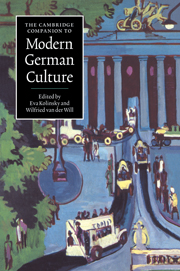Book contents
- Frontmatter
- In search of German culture: an introduction
- 1 The citizen and the state in modern Germany
- 2 German national identity
- 3 Elites and class structure
- 4 Jews in German society
- 5 Non-German minorities, women and the emergence of civil society
- 6 Critiques of culture
- 7 The functions of 'Volkskultur', mass culture and alternative culture
- 8 The development of German prose fiction
- 9 Modern German poetry
- 10 German drama, theatre and dance
- 11 Music in modern German culture
- 12 Modern German art
- 13 Modern German architecture
- 14 German cinema
- 15 The media of mass communication: the press, radio and television
- Index
5 - Non-German minorities, women and the emergence of civil society
Published online by Cambridge University Press: 28 May 2006
- Frontmatter
- In search of German culture: an introduction
- 1 The citizen and the state in modern Germany
- 2 German national identity
- 3 Elites and class structure
- 4 Jews in German society
- 5 Non-German minorities, women and the emergence of civil society
- 6 Critiques of culture
- 7 The functions of 'Volkskultur', mass culture and alternative culture
- 8 The development of German prose fiction
- 9 Modern German poetry
- 10 German drama, theatre and dance
- 11 Music in modern German culture
- 12 Modern German art
- 13 Modern German architecture
- 14 German cinema
- 15 The media of mass communication: the press, radio and television
- Index
Summary
In Germany, the emergence of both civil society and political democracy followed the same trajectory of modernisation. Like democracy, civil society had a troubled start in a country where state policies continued to emulate authoritarian traditions and restrict rights of social participation. Democracy and civil society took a firmer shape after 1945 when anti-democratic forces had lost their commanding influence while unprecedented economic growth reduced inequalities.
This chapter traces the emergence of civil society with reference to non-German labour migrants and to women. Both groups were largely excluded from rights of social participation at the beginning of the twentieth century and constituted a focal point of the National Socialist agenda. In the post-war era, the East German model decreed women's equality through employment and excluded non-Germans from civil society. The West German model extended social citizenship to non-German minorities and women without overcoming all legacies of exclusion that had gone before.
Labour migration and non-German minorities in German civil society
In the eighteenth and early nineteenth centuries when German rulers tried to develop the economy of their region and boost tax yield, foreigners played a key role as financiers, engineers or specially hired technicians. Non-German minorities who sought refuge from religious persecution - the Huguenots or Jews for instance - also benefited from the interest in importing modern business practices. Including such minorities into German society invariably took the form of special privileges. Although permitted to pursue their trades, these minorities remained excluded from civil society and their special status could be withdrawn at will by the ruler.
- Type
- Chapter
- Information
- The Cambridge Companion to Modern German Culture , pp. 110 - 131Publisher: Cambridge University PressPrint publication year: 1999
- 1
- Cited by



